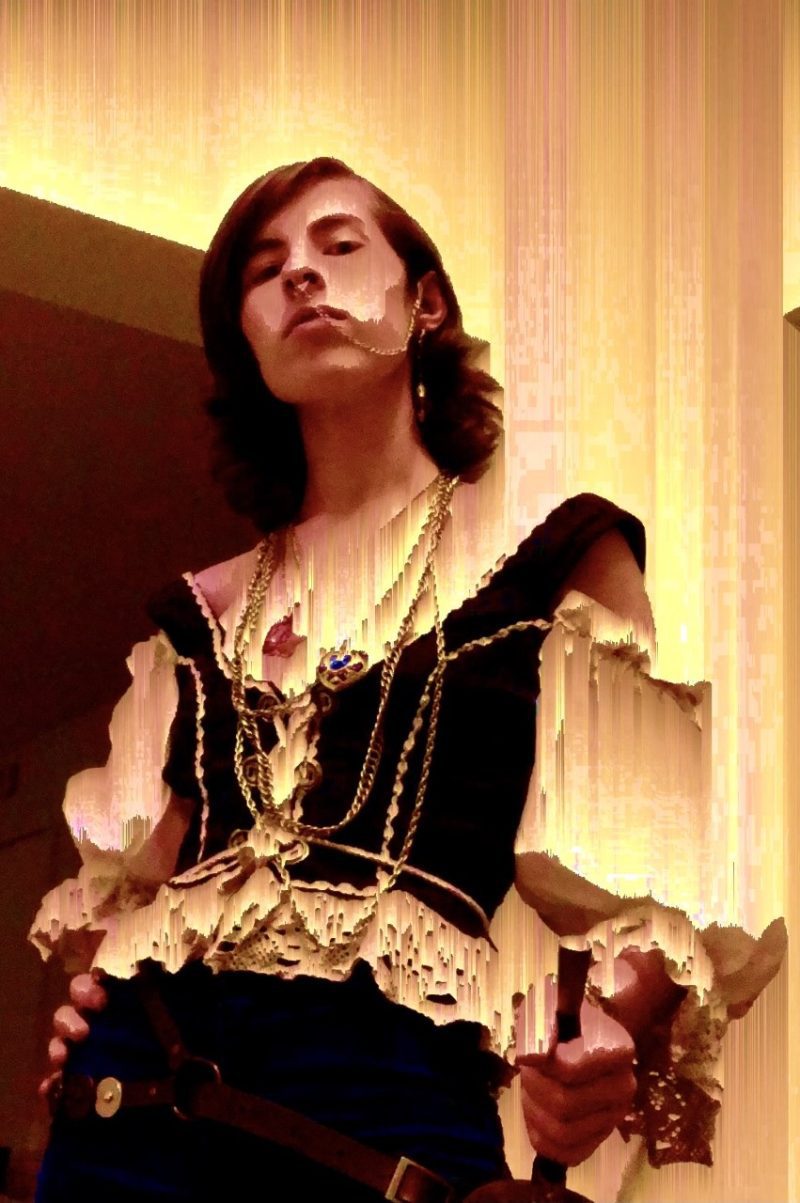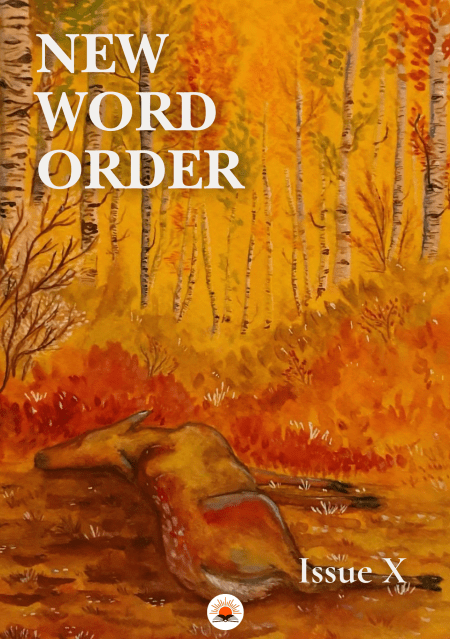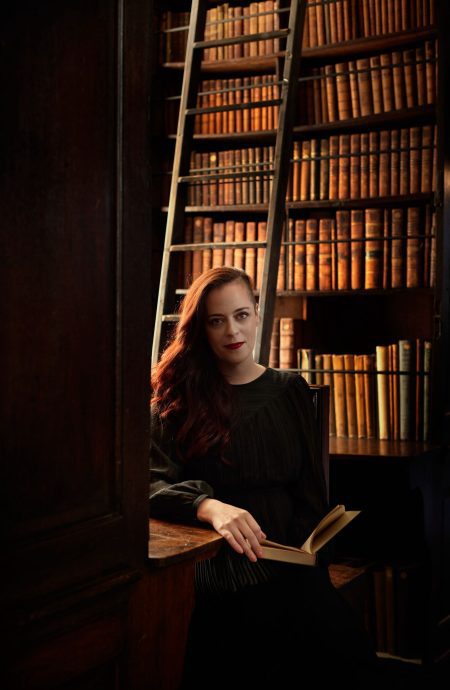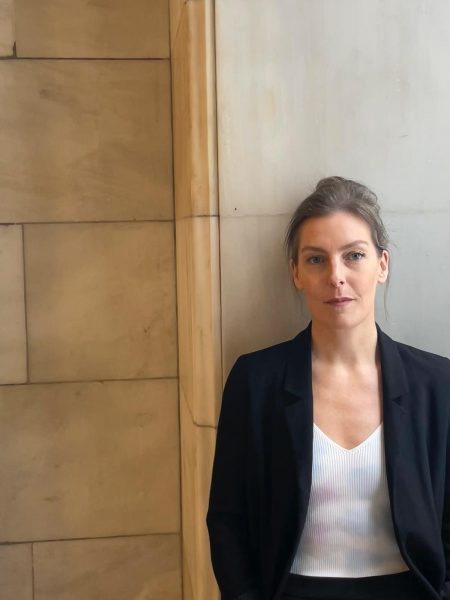By Beth Storey
Art By Ash Clancy
“Will you have another, Aisling?”
“I shouldn’t. Well – go on, then.”
Eileen signals to the barman. He nods, looking like his father when he does. He sets two pints down in front of them a few minutes later.
“Thanks, love.”
“Very welcome, Mrs. Mullins.”
She says to Aisling, “He’s a lovely lad, isn’t he?”
Aisling nods. “Spit of his father. Pulls as good a pint, as well.”
“That’s saying something.”
They sit quietly next to each other. Eileen looks at Aisling’s hand lifting her pint, and Aisling catches her at it.
“I know,” she says.
Eileen smiles. “You’re looking very well, Aisling.”
“Ah, I know that too,” Aisling tells her, “But still. The hands, sure. They never lie.”
She’s right. Aisling has always communicated predominantly through her hands, supplementing gestures for consonants and vowels. Her hands have carried her years. Where others wore their teenage years in the flush of their skin, the dilemma of their twenties in the cut of their hair, and the composure of middle age in the set of their mouth, Aisling expressed it all in her hands. The same is true today, her hands admitting to her age in their swollen knuckles, prominent veins, and stiff, arthritic fingers troubled by the cold of the pint.
Aisling’s hands – Eileen aged with them. She grew up in the west of Ireland, on the knife edge of Galway’s coast. She was made from unsurfaced backroads, work to roughen hands, a couple of pints and a packet of crisps down in the local pub (you know it – the old mirrors on the walls, the same familiar faces, and the waxy feel of the wooden tabletops beneath your hands; there are hundreds of others like it, but none the same), sprawling fields, bungalows of white stone, and harsh weather provoked by Atlantic winds. The desolate roads, the feeling of soft earth underneath her hands, and the irate, emotional sea; these are the only things Eileen remembers with the same clarity as Aisling’s hands.
“Aisling.”
“Yeah?”
“Do you remember the sea?”
Aisling sets her pint down again on the bar. “I do, yeah. Jesus.”
Eileen is picturing the sea – the Atlantic – around their ankles, on the last day before they left home. The sky above them boundless, unmarked. Under that sky, as shrapnel flew, as car tyres lost their grip, as the best man kissed the bride and people fought still over Jerusalem, she was going on eighteen. She asked herself, was she able for it, could she face it? She looked, then, over at Aisling, and saw the wind whipping her hair. She watched Aisling push the hair from her face, and she thought, okay. She could bear it.
Today – the door opens behind them and groans against the wood floors. The door was always stiff; Eileen remembers, years ago, pushing it open, putting her weight behind it. They walked into the pub for the first time with the ticket stubs from the bus that had driven them east still in their pockets. Aisling’s nails, she remembers, were painted blue for Dublin. They were dying for a pint, desperate for the weight of the glass in their hands. They knew, they’d feel less like children, less scared, when they had something to grip, to set down, pick up again. They could lift a pint, at least, with steady hands.
They ordered from the barman who would leave the place to his son, not fully realising where they were, how it was all in front of them in a way it never really would be again. That pint, really, might as well have been their first. It was the start.
The blue painted on Aisling’s nails was to Eileen the colour of youth; now, the pink of Aisling’s clean, unpainted nails is the thing which tells Eileen she is old. She’s lived her whole life by Aisling’s hands.
Aisling is smiling beside her. Eileen asks, “What?”
“Nothing. Just – I got thinking about your dad’s funeral. The state of our feet.”
Eileen looks down at her feet, at her sensible shoes, polished, tightly laced. She remembers standing in her childhood bedroom, twenty-four, looking in the mirror at the black dress she borrowed from a cousin. Putting on the dress, wearing the black, was as far as she was able to take it. She hadn’t put on shoes yet, and she decided she wouldn’t. She couldn’t bury her father without shoes, so if she didn’t put on shoes, she wouldn’t have to.
Aisling had come in and stood beside her. Eileen saw her in the mirror, and it surprised her, how Aisling looked as she always had when everything else had become so dim, so out of focus. She remembers likening her to the weeping statue, seeing faith take shape in Aisling’s voice, her eyes, in the fall of her hair – and, of course, in her hands.
She told Aisling, “I can’t bury him.”
“You have to.”
“I can’t. I can’t put on shoes.”
Aisling considered this. “Well, you don’t have to put on shoes.”
“No shoes?”
“No shoes. But we’ll bury him.”
They were barefoot at the graveside. When Eileen stepped forward to scatter a handful of earth on her father’s coffin, the grass and the dirt under her feet made her feel closer to him. It was as though she didn’t have to leave him, so long as she could feel the earth he was under.
Now, years later, Eileen answers, “Father McLoughlin never looked at me the same way after that.”
“Will you go barefoot to my funeral, Eileen?”
“Feck off. I’m dying first.”
“You’re probably right. The state of you.”
She looks well, Aisling. She always does in here. It suits her.
Aisling’s father used to own the local, and she grew up wiping tables and collecting glasses. She pulled her first pint when she was eight years old. They lived above the pub, but not really; Aisling did her homework at the bar instead of the kitchen table, watched the matches on the weekends with the drinking crowd in their county colours, and even had her first period in the bathroom marked as Mná.
She was getting ready to leave for school one morning – knotting her tie in front of the old mirror hanging behind the bar – when Eileen walked in. They were both sixteen, not yet grown into their looks, still wearing navy uniforms. They had been in the same school for years, but they only knew each other to say hello. Eileen had had a bad morning; she took in the empty pub, and then she looked at Aisling.
“Here,” she said. “Any chance of a pint?”
It was half eight in the morning. Aisling glanced at her, finished knotting her tie, and said, “Go on, then.”
She fixed them a pint each, and they sat at the bar in their uniforms. The pub was filled with the light of early morning, and they talked easily; I can’t find my Irish book, and St. Anthony’s not answering me; did you hear Margaret Rourke is going with the youngest O’Toole lad; do you think we’ll ever get out of this place?
They finished their pints, rinsed the glasses, and walked to school. That was it. From then on, Eileen woke early on weekdays and had her share of work on the farm finished before school, and she and Aisling did their homework every evening sitting at the bar. On the weekends, Eileen helped with the serving in the pub. She liked the busyness, the rhythm of it. She liked having somewhere to be.
They never held back. They went for it, loving each other in the way girls do. From the minute Aisling set those two pints down on the bar, it was decided; they would talk about the lads in their year, give out yards about sexist teachers and outdated notions, hold the other while one of them was crying, and sing loudly and badly along struggling country lanes. It was friendship; it felt like they were inventing it.
Now, Aisling nods at the pub around them, “The place hasn’t changed.”
She’s right. The old mirrors on the walls, the sun shining through the windows to warm the wooden tabletops, the weight of the pint glasses in their hands; it’s all the same.
She forgets, then. She forgets how poor her eyesight is getting, how often she wakes in the night needing the loo. Instead, she’s twenty, they’re talking about sex, about how nothing the nuns told them in school was true. It’s her twenty-fifth birthday, Aisling is buying her a pint, and she’s trying not to cry because she’s convinced herself that she’s old and running out of time. She’s pregnant on her third, worrying she can’t afford it, and Aisling is doing sums on a napkin, finding corners to cut. Her arm is around Aisling as she listens to her worry about her daughter’s drug habit, she’s looking for the right words, finding nothing. She’s laughing, telling Aisling how nearly everybody on the bus stood up to offer her a seat when she got on, talking about quickly it’s all passing, about the legs they used to have. Eileen, well into her seventies, feels it all again.
She could be in any of those years long since passed; the wooden stool she’s sitting on is the same she sat down on that first day in Dublin. Her knee isn’t even aching like it was when she first sat down. Why should it – the barman hasn’t aged a day since she was seventeen, chancing her arm and ordering a pint like she had been doing it for years. But then she looks at Aisling’s hands again and remembers that the young lad cleaning the glasses is the barman’s son. Nothing has changed, except for Aisling’s hands.
Eileen takes another drink from her pint. She looks at her own hands, rubs her wedding band. She thinks of the day he put it on her finger, him proposing on the middle of the Ha’penny Bridge, causing a scene, embarrassing her. She remembers telling Aisling, thrilled, terrified, and Aisling laughing, saying, “Eileen, love, he asked me for my blessing.”
Eileen had cried at that, she remembers; she had been sure, for the first time, that he really knew her. She cried, as well, a short twenty-six years later, when she buried him sooner than she felt was fair. Aisling had been there, her hands gripping Eileen’s, holding her up.
“Aisling,” Eileen says.
“Yeah?”
“I love you.”
“Is this your way of reminding me that it’s my round next?”
“No. Well, maybe. But – I love you.”
Aisling takes Eileen’s hand in hers. “I love you too.”
Eileen nods. She has probably had one pint too many. She says, “Good.”
They sit comfortably in silence. Eileen looks at Aisling, and she sees the face she recognises. She sees Aisling’s warm brown hair; her soft, blushing skin; the lovely slope of her neck (boys fell in love with that neck, remember, Aisling?); her jawline, her cheekbones, both cut like landscapes; her mouth, smiling, always arguing with grief; her figure, gorgeous, miles away from any age where the number matters. She sees all this, where the mirror behind the bar reflects a white-haired lady well into her seventies. Except, of course, when she looks at the hand lifting the pint.
“Jesus, Aisling,” Eileen says. “I really can’t get over your hands.”
Beth Storey
Beth Storey is a writer from Dublin currently focusing on short stories. Her work has been published in the Dublin-based Martello journal and the Irish online journal Trasna, and is forthcoming in the online Flash Fiction Magazine and the Sans. Press Archive. She hopes to get more of my work out there.



